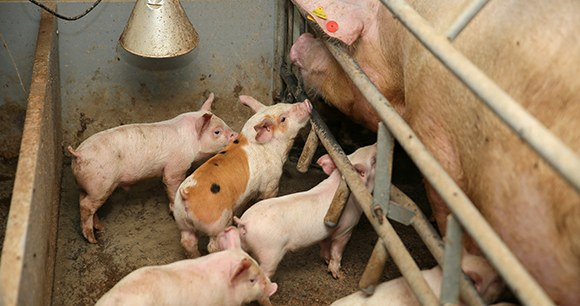AVMA Should Aver: Cramped Crates No Place for Pregnant Pigs
The American Veterinary Medical Association develops and endorses dozens of policies on a range of issues, including several that relate to farmed animals. These policies are important because, in addition to functioning as the organization’s guiding principles, they often influence regulatory bodies and the animal agriculture and food industries.
This year, the AVMA’s policy on pregnant sow housing is being reviewed by the association’s Animal Welfare Committee. Dr. Gwendy Reyes-Illg, the veterinary medicine consultant for AWI’s Farmed Animal Program, submitted extensive comments laying out scientific and ethical arguments for why the AVMA should revise its policy to recommend higher-welfare group housing systems over inhumane gestation crates.

Gestation crates (aka individual stalls) are metal enclosures, typically about 2 feet wide and 7 feet long, used to confine most pregnant pigs in the United States from the time their piglets are forcibly weaned (two to four weeks after birth) until they are ready to give birth to their next litter—which, in industrial settings, ends up being most of a breeding sow’s life.
Pregnant sows are quite large (typically 500–800 pounds), so this confinement essentially immobilizes them, prevents most of their natural behaviors (including walking, running, nest-building, rooting, and foraging), and causes an array of physical and psychological problems. Most crate-confined sows develop frequent stereotypies (repetitive, functionless movement patterns, like bar-biting) and/or “low responsiveness,” a syndrome similar to severe clinical depression in humans.
The comments argue that, given the AVMA’s stated values—particularly in light of research that has advanced our understanding of pigs’ mental capacities and welfare needs, as well as shifts in societal values since the current policy was passed—the association should encourage a transition from gestation crates to group housing. Further, since keeping pigs in groups does not, in and of itself, guarantee better welfare, the AVMA should provide substantive, evidence-based recommendations regarding how to maximize welfare in group housing systems.
Health and welfare problems caused by confinement to gestation crates generally cannot be ameliorated by changes in management or crate design. Conversely, the potential welfare hazards associated with group housing systems can often be avoided. When pregnant pigs are kept in groups, top welfare concerns include inter-pig aggression and lameness. However, both problems can be mitigated by sufficient space (especially in the first few days after unfamiliar pigs are mixed), appropriate flooring and bedding, proper pen design and layout, and limitations on group size and composition.
It’s also crucial to mitigate chronic hunger, a neglected welfare problem experienced by most pregnant pigs regardless of housing system. Because they have been genetically selected for “production” characteristics such as rapid weight gain, mother pigs provided with unlimited amounts of energy-dense feed develop obesity and attendant health problems; therefore, sows are typically fed less than half of what they need for satiety. Measures to alleviate chronic hunger, such as providing roughage (e.g., straw), satiety-promoting feeds, and foraging opportunities via access to pasture, also reduce certain stereotypies, inter-pig aggression, and resulting injuries.
AWI anticipates a decision about the policy next year. The comments are posted here.
Program Terms: Farmed Animals
AWI Quarterly Terms: Feature Article
Related News
Titus Reintroduces Humane Transport of Farmed Animals Act as New AWI Report Reveals Feeble Enforcement of Welfare Violations
In Program: Farmed AnimalsToday, US Rep. Dina Titus (D-NV) reintroduced the Humane Transport of Farmed Animals Act to improve conditions for livestock transported across the United States. The bill would...
New Poll: Consumers Overwhelmingly Support Meaningful Standards for “Humanely Raised” Food Label
In Program: Farmed AnimalsEighty-eight percent of American consumers believe that claims such as “humanely raised” or “sustainably farmed” on meat and poultry products should be based on meaningful,...
New Research: USDA Fails to Pursue Prosecutions of Slaughter Plants, Despite Repeat Violations
In Program: Farmed AnimalsRepeat violators of the federal Humane Methods of Slaughter Act (HMSA) continue to escape meaningful enforcement by the US Department of Agriculture, resulting in continued...
AWI Scholarship Winners Campaign for a Better World for Animals
In Program: Animals in Laboratories, Farmed AnimalsThe Animal Welfare Institute (AWI) announced today the 12 winners of a scholarship designed to invest in future leaders who seek to improve the lives...